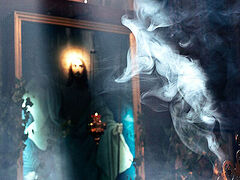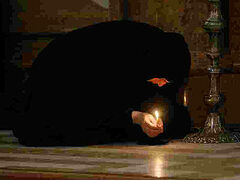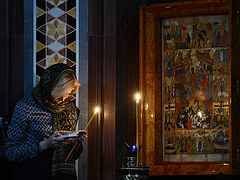Great Lent is a time of detachment from worldly matters and communion with God. We walk towards Christ, prepare ourselves for Pascha, and cleanse our bodies and souls from earthly things. Fasting is not a diet, but a time for prayer. What special church services should be attended during this period? What is Unction? Is it necessary to take children to long Lenten services? We have tried to answer these and other questions in a talk with Priest Vasily Pistsov, priest of the St. Seraphim Cathedral in the Russian city of Kirov, head of the Subdepartment of Theology at the Vyatka Theological School in Kirov, and a Master of Theology.
—Father Vasily, on which days of Great Lent are we supposed to be in church?
—Great Lent is a very special time, including in the Church calendar, but not all days of Great Lent are the same. Therefore, we can single out particularly revered days that should be spent in church, as they are imbued with a special meaning. The Great Penitential Canon of St. Andrew of Crete is read on the first four days of the first week of Great Lent. It is read at an evening service called Great Compline.
The Canon of St. Andrew of Crete is a very bright spiritual work that guides us primarily towards arousing the feeling of repentance, understanding our lives and prepares us for the entire period of Great Lent. The Canon is large enough and divided into four parts, each of which is read on a specific day.
—If someone works and cannot be present at the reading of the Canon of St. Andrew of Crete, can he pray at home instead?
—In fact, in the Church there is no strict rule that if you can’t get to this or that service, it must be replaced by something else. No. But so as not to lose the repentant mood that is cultivated by the Canon it will certainly be useful to read it at home. Another thing is that someone should not think: “Well, today it’s hard for me to go to the Canon, so I’ll read it on the couch at home.” Of course, it’s better to go to church for common prayer.
—Are there any other special services during Great Lent that would be desirable to attend?
—Further, according to the Church Typicon, the order of services will be changed. Thus, during Great Lent the only weekdays when the Liturgy is celebrated are Wednesdays and Fridays. The Liturgy of the Presanctified Gifts is celebrated on those days. This service is very glorious, with beautiful chants and a calm repentant mood. Its distinctive feature is that bread and wine do not become the Body and Blood of Christ during that service, but rather believers partake of the Gifts prepared in advance. It is important to prepare and receive Communion not only on Saturdays and Sundays, when the full Liturgy is celebrated, but also on Wednesdays and Fridays.
In addition, it should be noted that each Sunday in Great Lent has its own meaning. That is, it not only glorifies the Risen Christ, but also reminds us of various events and the lives of the saints who teach us to live a righteous life. For example, the first Sunday is dedicated to the feast of the Triumph of Orthodoxy, the second—to St. Gregory Palamas, the third—the veneration of the Cross, the fourth—St. John of the Ladder, the fifth—the Venerable Mary of Egypt, and the last—the feast of the Entry of the Lord into Jerusalem (Palm Sunday). Next is Holy Week.
In addition to these festive Sundays of Great Lent, there are several more special services within the week. First of all, this is the famous service of the “Standing of St. Mary of Egypt”, which takes place on the Wednesday evening of the fifth week of Great Lent. On the same week, on Saturday, the glorification of the Most Holy Theotokos is also celebrated, which is called the Laudation of the Mother of God, or the “Saturday of the Akathist Hymn”.
This is a brief summary of the special days of Great Lent. As for Holy Week—that is, the week before Pascha, it is impossible to single out any particular day there because every day has its special meaning. Of course, during this week we should make every effort to attend church services as often as possible before Pascha.
—When should we take Communion during the last week of Great Lent: on Wednesday or Thursday?
—Communion during Holy Week of Great Lent takes place every day except for Holy Friday when the Liturgy is not celebrated. However, a special day for Communion is, of course, Holy and Great Thursday because it was on this day that Christ Himself established this sacrament. By taking Communion on this day, we try to come in contact with the events when the Apostles sat next to Christ, and His words: This do in remembrance of Me (1 Cor., 11:24).
—Which Lenten services can children be taken to?
—Children perceive prayer a little differently than adults. We try to pass prayers through our consciousness, while for a child it is often not so important—for most children a living impression of communion with God is much more important. So, no definite advice can be given here. If a child knows what prayer is and has his own experience of praying with his parents at home, he can be taken to long services. If a child does not have such experience, it is likely to be incomprehensible and unnatural for him. In addition, it should be borne in mind that services in an ordinary parish church and in a monastery are different. Recalling my feelings from childhood (I attended parish services), I can say that it was hard for me to pray in a monastery church, although I did have experience of prayer.
—Can we take children to Communion at the Liturgy of the Presanctified Gifts?
—Communion at the Liturgy of the Presanctified Gifts is not recommended for children. The fact is that at this Liturgy the chalice contains only blessed wine, and the particles of the Lamb (the Bread that has transformed into the Body of Christ) are soaked with the Blood of Christ beforehand. Since babies due to their physiology cannot be communed with a particle of the Body, and there is no Blood in the chalice, they are not communed at the Liturgy of the Presanctified Gifts. This ban has existed in the Church since the nineteenth century, though now there are different opinions on this matter.
—Let’s talk about the sacrament of Unction, which is celebrated in all churches during Great Lent.
—Unction is a sacrament that is celebrated not only during Great Lent, but since it is directly related to repentance and often preceded by confession, many people choose the time of fasting to have Unction, which is quite natural. Another thing is that some misconceptions are associated with this sacrament, specifically, that this is supposedly the last sacrament performed before a person’s death and reveals the will of God—whether he will continue to live or die. Of course, the sacrament of Unction also has such an interpretation, but it is intended not only for those on their deathbeds. If we read the Holy Scriptures, we will see that the Apostle James in his Epistle says: Is any sick among you? let him call for the elders of the church; and let them pray over him, anointing him with oil in the name of the Lord (Jm. 5:14). That is, we are talking about a sick person in general, so when we have bodily ailments and want to ask for God’s help, we can resort to the sacrament of Unction. Again, it is illogical to bring children under seven to Unction and take Unction as a pure formality just because Great Lent is here.
—Do we have Unction once?
—There are no canonical rules limiting the number of times Unction can be celebrated. But here, as with all other sacraments, common sense is important so it doesn’t happen that you go and have Unction every week. It is quite logical for a person who isn’t in a critical condition to have Unction once per fast.
—What do we expect from Unction? Is it appropriate to wait for recovery the next day? What if there is no recovery at all?
—The meaning of the sacrament of Unction is always an appeal to God. Turning to God in this sacrament, we expect from Him the same thing that we expect from prayer: that the Lord will give us what we ask for provided that it will benefit us and we have prayed sincerely, accompanying this with a change in our Christian lives. It is important to understand that Unction carries no magical function. If we are not cured after this sacrament, it is logical to ask ourselves the question, why? It is followed by a very beneficial chain of reasoning for each person, which shows the imperfection of his life.




